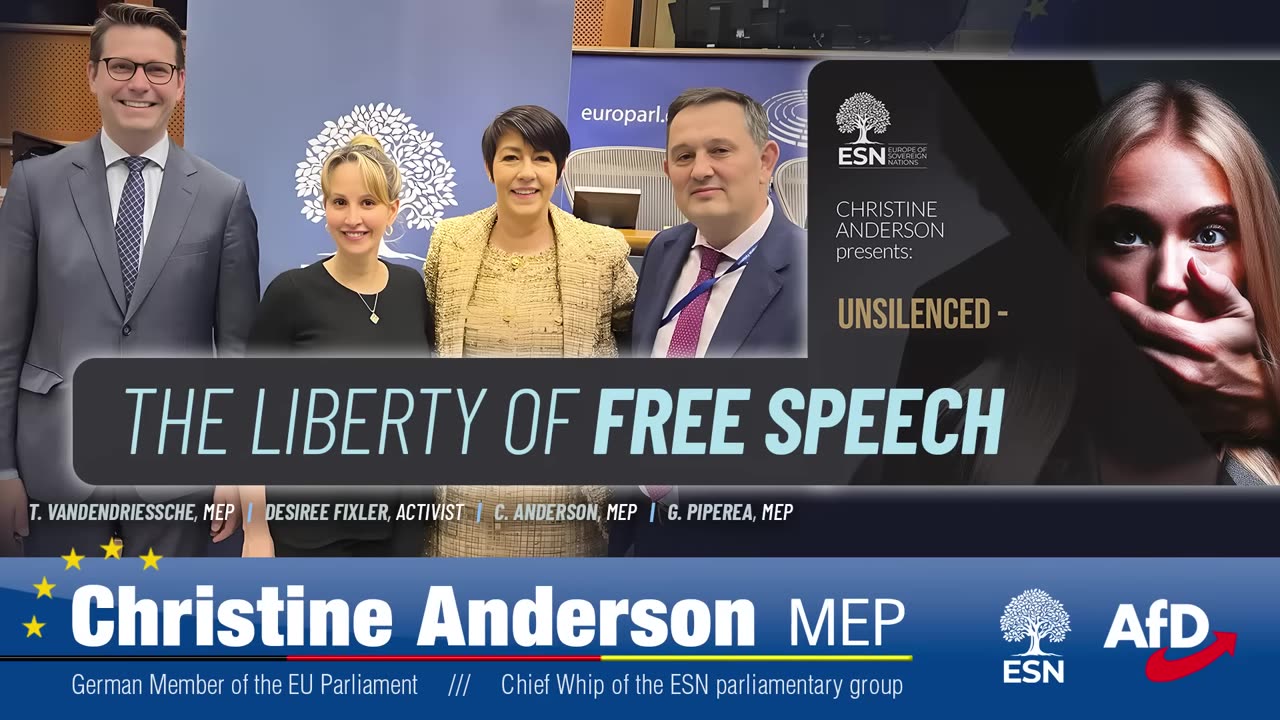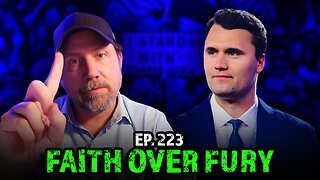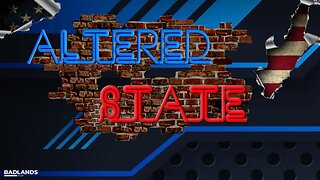Premium Only Content

“Freedom of Speech” Christine Anderson, MdEP 🇪🇺 EU Fight Against Censorship
⚠️source: https://youtube.com/@ChristineAnderson_MdEP/videos
⚠️see also: https://projectavalon.net/forum4/showthread.php?80790-Internet-Censorship-So-it-continues...
⚠️ follow me on: https://x.com/JohnKuhles1966
Christine Anderson, MdEP 🇪🇺 EU Parliament. As part of an event organized by my ESN Group on the topic of “Freedom of speech”, she gave the participants valuable insights into a world that is otherwise unknown to many. Fixler went from being the former Chief Sustainability Officer of 💶 Deutsche Bank subsidiary DWS to a whistleblower and paid a high price for exposing the ESG fraud. Find out how Desiree Fixler recognized the woke agenda as a global scam, how she freed herself from the “woke mind virus” and why she is now an activist fighting resolutely against censorship and for the preservation of freedom of speech.
The provided text appears to be a detailed transcript of a speech and discussion event hosted by Christine Anderson, a Member of the European Parliament (MEP), focusing on the topic of freedom of speech. The event was organized by the ESN Group, a working group dedicated to this issue. A key speaker at the event was Desiree Fixler, a former Chief Sustainability Officer at DWS (a Deutsche Bank subsidiary), who transitioned from a corporate role to becoming a whistleblower exposing what she describes as fraudulent practices within the Environmental, Social, and Governance (ESG) movement. Below, I’ll address the main points of your query, summarizing Fixler’s journey, her recognition of the "woke agenda" as a scam, her liberation from the "woke mind virus," and her activism against censorship and for free speech. I’ll also incorporate relevant context from the transcript and clarify any points as needed.
Desiree Fixler’s Journey: From Chief Sustainability Officer to Whistleblower
Background and Role at DWS:
Desiree Fixler was the Chief Sustainability Officer at DWS, the asset management arm of Deutsche Bank, managing roughly $1 trillion in assets. Her role placed her at the forefront of the ESG movement, which aims to align corporate investments with environmental, social, and governance principles.
Initially, Fixler was a proponent of ESG, believing in its promise to deliver ethical responsibility alongside financial returns. She describes feeling proud of the "win-win" narrative of making money while doing good for the planet and people.
Recognizing the ESG Fraud:
Fixler’s perspective shifted as she observed discrepancies between the ESG movement’s promises and its actual practices. She concluded that ESG was not about genuine ethical progress but rather a mechanism for control, imposing ideological standards under the guise of virtue.
She exposed what she describes as a "multi-trillion dollar marketing scam" that misled investors by overcharging them for investments falsely branded as sustainable. Fixler revealed that major firms, including DWS, misrepresented their sustainability claims, prioritizing optics over reality.
In her speech, she states, “ESG net zero and its DEI component harms society. It’s nothing but a multi-trillion dollar marketing scam that sought to overcharge and swindle investors under the guise of virtue to save the planet and people.”
Whistleblowing and Consequences:
Fixler raised her concerns about ESG fraud internally at DWS, presenting evidence of misrepresentation. Instead of addressing her concerns, DWS dismissed her, fired her, and publicly smeared her reputation by claiming she was unethical and underperformed.
Facing a lack of support in Germany—where she was based in Frankfurt in 2021—she attempted to share her story with the German media (Deutsche Welle), but the story was suppressed. She notes the German regulator (BaFin) had a poor reputation for protecting whistleblowers, citing its involvement in the Wirecard scandal.
Fixler eventually shared her evidence with a friend, a prominent journalist formerly associated with the Wall Street Journal. The Journal investigated and published her story, validating her claims. This led to significant fallout:U.S. authorities (SEC, FBI, DOJ) intervened, issuing guilty verdicts.
Germany’s Bundesbank opened a criminal investigation, which remains ongoing.
Several individuals at DWS were fired, though Fixler emphasizes her goal was not retribution but to “pop the green bubble” and expose ESG’s fraudulent nature.
Personal Cost:
Fixler paid a high professional and personal price for her whistleblowing. She faced public smearing, job loss, and initial media suppression in Germany. Her experience underscores the severe consequences of speaking truth to power, a recurring theme in the event’s discussion on free speech.
Liberation from the “Woke Mind Virus”
Initial Belief in the Woke Agenda:
Fixler candidly admits she was once fully supportive of the “woke agenda,” including net zero policies, Diversity, Equity, and Inclusion (DEI) initiatives, and the broader ESG framework. She describes this as a period where she felt morally superior, believing these initiatives were both profitable and virtuous.
She states, “I was totally sold on the woke agenda. I supported net zero, DEI. Oh, let’s save the planet and people. It felt so good to say win-win.”
Awakening and “Red-Pilling”:
Fixler’s shift in perspective was gradual, driven by observing real-world outcomes that contradicted the woke narrative. She mentions several factors that led to her awakening:Data and Results: As a banker, she relied on data and research, which revealed the harmful outcomes of policies like lockdowns, questionable COVID vaccines, censorship, open borders, and affordability crises.
Common Sense: She describes a moment of clarity where “common sense kicks in,” leading her to question the efficacy and motives behind these policies.
Personal Reflection: Fixler likens her transformation to being “red-pilled,” a term borrowed from internet culture to describe waking up to uncomfortable truths. She realized she was “wrong” and “misguided” in her earlier beliefs.
She draws an analogy from Lloyd Blankfein, former CEO of Goldman Sachs, who said, “The best traders aren’t right more than they’re wrong. They are quick adjusters. They are better at getting right when they’re wrong.” Fixler adjusted her worldview, aligning with a more critical perspective on collectivist ideologies.
Broader Context:
Fixler connects her personal awakening to a larger trend in the U.S., where she believes many former Democrats underwent similar transformations. She cites the U.S.’s ability to self-correct through free speech, contrasting this with Europe’s doubling down on censorship.
Her liberation from the “woke mind virus” (a term popularized by figures like Elon Musk) reflects her rejection of ideological conformity and embrace of critical thinking, which she now champions as essential for societal progress.
Activism Against Censorship and for Free Speech
Motivation for Activism:
Fixler’s experience as a whistleblower galvanized her into becoming a free speech activist. She views free speech as a critical tool for exposing corruption and holding power accountable, drawing from her own battle to reveal ESG fraud.
She emphasizes that her activism is not just about her personal story but about preventing the broader harm caused by censorship and ideological control. She states, “The right to free speech absolutely includes the right to offend. The right to free speech is a crucial prerequisite for democracy.”
Critique of Censorship:
Fixler criticizes Europe’s approach to free speech, particularly the European Union’s Digital Services Act (DSA) and efforts to ban “disinformation.” She argues that these measures empower elites to decide what constitutes truth, stifling dissent and protecting their narratives.
She highlights specific examples, such as Germany’s prosecution of citizens for online insults (e.g., calling a politician “fat”) and the hypocrisy of allowing public smearing of figures like Elon Musk while punishing trivial speech.
Fixler warns that censorship assumes people are too weak to handle debate or dissent, creating a “moral superiority board” that labels conservative or populist movements as far-right or fascist to silence them.
Advocacy for Free Speech:
Fixler advocates for a robust defense of free speech, arguing it is essential for innovation, truth-seeking, and democratic accountability. She cites historical figures like Copernicus, Edison, and Musk, whose contributions stemmed from free thinking.
She contrasts the U.S.’s retreat from censorship under the new Trump administration with Europe’s increasing restrictions, urging Europe to trust its citizens to debate and self-correct.
Fixler praises platforms like X (formerly Twitter) for fostering raw, unfiltered discourse, which she believes is more conducive to truth than conformist platforms like LinkedIn. She notes, “X’s rawness and conviction is so much better than LinkedIn’s conformity.”
Personal Commitment:
As a self-described “libertarian conservative” and “patriotic American,” Fixler expresses a strong belief in values like border control, low taxes, national pride, affordable energy, small government, and free speech. She feels she is working “behind enemy lines” in Europe, where these views are less prevalent.
Her activism is fueled by optimism, drawing inspiration from U.S. political shifts (e.g., Trump’s election, the flipping of a liberal New York congressional district). She encourages persistent free speech advocacy, stating, “We must always speak up and cherish free speech.”
Christine Anderson’s Role and the Event’s Context
Christine Anderson’s Introduction:
As an MEP and host of the ESN Group’s first event on freedom of speech, Christine Anderson frames the discussion as a defense of a fundamental yet increasingly fragile right. She argues that free speech is not free if it comes with severe consequences like professional ruin, social ostracism, or criminalization.
Anderson cites examples of free speech suppression in Europe, such as a German citizen facing a police raid for posting a meme insulting a politician. She criticizes the EU’s push to ban “disinformation,” arguing it allows those in power to control narratives.
She introduces Fixler as someone who has paid a high price for speaking truth, emphasizing the need to fight for free speech to protect democracy.
Broader Themes from the Event:
The event features other speakers, including Tom Vandendriessche (Pat प्राप्तीots group) and an ECR group member, who echo Fixler’s and Anderson’s concerns about censorship as a power grab by elites. They criticize the EU’s bureaucratic overreach, the DSA, and the use of “fact-checkers” to control information.
Speakers draw parallels between historical censorship (e.g., the printing press, banned books) and modern social media crackdowns, arguing that those in power fear citizens’ ability to challenge their authority.
The discussion highlights a perceived divergence between U.S. and European values, with the U.S. seen as course-correcting toward free speech under Trump, while Europe doubles down on restrictions.
Clarifications and Observations
ESG as a “Global Scam”: Fixler’s critique of ESG aligns with broader skepticism about its effectiveness, as voiced by some conservative and populist figures. Critics argue ESG prioritizes ideological goals over economic performance, though proponents defend it as a framework for sustainable investing. Fixler’s whistleblowing adds a firsthand perspective, claiming misrepresentation at a major financial institution.
“Woke Mind Virus”: This term, popularized by Elon Musk, refers to perceived ideological conformity in progressive movements. Fixler’s use of it reflects her alignment with U.S. conservative rhetoric, contrasting with her earlier support for progressive causes.
Free Speech in Europe vs. U.S.: The speakers highlight a cultural and legal divide, with the U.S.’s First Amendment offering stronger protections than Europe’s more regulated speech laws. Fixler and others argue Europe’s laws, like Germany’s hate speech prosecutions, infantilize citizens and stifle debate.
Accuracy of Transcript: The transcript, noted as speech-to-text, contains minor errors (e.g., “Desert Fixler” instead of Desiree Fixler, “Obed Habek” instead of Robert Habeck). I’ve corrected these where relevant for clarity.
Telegram Links: Anderson’s Telegram channels (t.me/christineanderson) are provided for English and German-speaking audiences, indicating her use of alternative platforms to bypass mainstream media censorship.
Conclusion
Desiree Fixler’s journey from Chief Sustainability Officer at DWS to a free speech activist illustrates the personal and professional risks of challenging powerful institutions. She recognized the ESG movement as a fraudulent scam through data, observation, and common sense, leading her to reject the “woke agenda” she once embraced. Her whistleblowing exposed misrepresentation in ESG investing, costing her job and reputation but ultimately sparking investigations and accountability. Now an ardent free speech advocate, Fixler fights against censorship, which she sees as a tool of elite control, and promotes open discourse as essential for democracy and innovation. Her story, shared at Christine Anderson’s ESN Group event, underscores the broader struggle for free speech in Europe, where she and others perceive a growing authoritarianism contrasting with the U.S.’s recent shift toward greater speech protections.
-
 LIVE
LIVE
Akademiks
2 hours agoYoung Thug Dissing YFN Lucci. Ready to Go back to Jail. Offset vs Cardi b
1,244 watching -
 7:07
7:07
Colion Noir
11 hours agoCalifornia Just Banned All Glocks
6.77K17 -
 LIVE
LIVE
Adam Does Movies
4 hours agoTalking Movies + Ask Me Anything - LIVE
33 watching -
 LIVE
LIVE
Jamie Kennedy
1 hour agoChoosing Good in a World Gone Dark | Ep 223 HTBITY with Jamie Kennedy
56 watching -
 LIVE
LIVE
The Jimmy Dore Show
2 hours agoNew Footage Shows Charlie Kirk Shot FROM BEHIND! Google ADMITS To COVID Censorship! w/John Kiriakou
6,899 watching -
 LIVE
LIVE
SpartakusLIVE
5 hours ago#1 Challenge CHAMPION of WZ || Ridin' The GRAVY Train w/ GloryJean
295 watching -
 LIVE
LIVE
The Pascal Show
59 minutes agoDISTURBING UPDATES! New Developments In The D4vd Celeste Case... Possible Celeste Sighting?!
85 watching -
 2:03:18
2:03:18
The Charlie Kirk Show
3 hours agoTPUSA Presents This is The Turning Point Tour LIVE with Megyn Kelly and Governor Glenn Youngkin!!
189K53 -
 LIVE
LIVE
Badlands Media
19 hours agoAltered State S3 Ep. 47
2,440 watching -
 LIVE
LIVE
putther
2 hours ago $0.52 earned⭐ Bounty Hunting on GTA⭐
76 watching